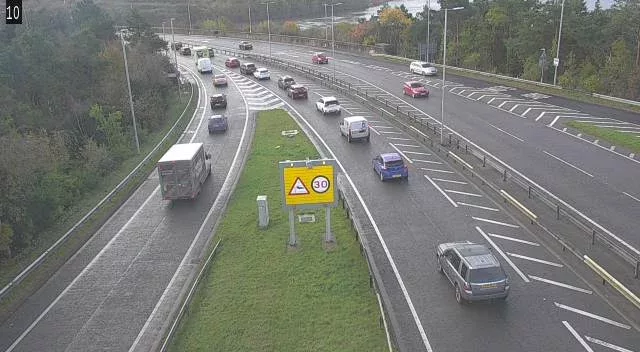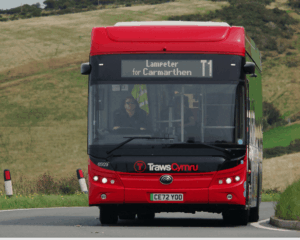Lee Waters MS, Deputy Minister for Climate Change at the Welsh Government, has said the government is making progress on national highways and transport developments following the publication of the National Transport Delivery Plan and Welsh Government’s response to the roads review earlier this year.
He said that Welsh transport infrastructure must be safe, accessible, well-maintained and future-proofed.
“To achieve this, we need to think differently about how we manage and maintain our network, to comply with our statutory duties and our response to the climate emergency. To better understand the changes required, I commissioned an independent review of the annual programmes of work, led by Matthew Lugg OBE, and their suitability for the management of the strategic road network in Wales,” Mr Waters said.
The review took an in-depth view of current statutory requirements, suitability and affordability of the maintenance and improvement commitments, and the current operating model for delivery.
“My officials have considered the recommendations of the Lugg report and how they can be applied to develop and implement a new approach to the operation, maintenance and improvement of the strategic road network based on robust asset management principles.
“This also takes account of the Welsh Government’s tests and conditions for road investment and the core principles of the Wales Transport Strategy through more sustainable maintenance and improvement programmes. The Welsh Government’s response to the recommendations will adopt the report’s recommendations including the development of the new prioritised approach to maintaining, renewing, and improving assets, the heart of which will be a programme of renewals to major assets which will be designed to address the significant backlog of essential maintenance required,” Mr Waters added.
He went on to say that with careful planning, expenditure on road maintenance can achieve better value and make a significant contribution to the delivery of the Welsh Government’s wider policy aims and objectives for tackling climate change and delivering modal shift.
“I would like to thank Matthew Lugg OBE and the panel members for their expertise, insight, and valuable opinion on how we should maintain our network to ensure that the statutory commitments of Welsh Government’s role as a highway authority are fully retained,” Mr Waters said.
As part of the roads review recommendations and Welsh Government’s response including the decision not to proceed with the A55 3rd Menai Crossing, Flintshire Corridor Improvements and A483 Junction 3-6 Improvement schemes in their current form, I have agreed to write off part of the costs incurred by Welsh Government in developing these schemes. The reduction in value of historic expenditure on these schemes has been assessed at £5.7m and will be included in Welsh Government accounts for 2022/23.
Mr Waters said that the remaining costs will be reviewed periodically, as required by Managing Welsh Public Money, to ensure they still represent future value. For example, the North Wales Transport Commission is using some of this material and its value could therefore be realised through its use on a range of other potential infrastructure projects or programmes.
“We continue to work on options to progress the Llandeilo bypass scheme. We will continue to seek engagement with Carmarthenshire Council to the agree the best mechanisms to deliver transport improvements on the A483 at Llandeilo. We are also exploring the diversion of heavy goods vehicles from Llandeilo and have asked Professor Andrew Potter to support us with this work,” said Mr Waters.
He said he will shortly be issuing guidance to Corporate Joint Committees (CJCs) on their Regional Transport Plans (RTPs). The RTPs will be critical to delivering the ambitions and priorities of the Wales Transport Strategy at a local and regional level. The RTPs and new Strategic Development Plans will be co-developed by CJCs to ensure a more joined up approach to land-use and transport planning.
“I have also appointed Cllrs Hunt and Medi to lead a ‘Place Based Development Advisory Group’. They will be tasked with examining ways of working between transport, land use planning and development and making recommendations about how those areas can better integrate to achieve shared objectives,” he added.
“I will be publishing our Active Travel Delivery Plan which sets out our approach to improving and speeding up implementation of active travel schemes and programmes in Wales, and the specific actions we and our delivery partners will be taking over the next four years. The plan was developed in response to the recommendations made by the Cross-Party Group on the Active Travel Act in the review they undertook in 2022 and will provide a clear focus for how we direct our resources and efforts over the coming years.”
The Government will be shortly be publishing the updated Welsh Transport Appraisal Guidance (WelTAG) as part of a new approach to transport in Wales that begins with our new Wales Transport Strategy and flows through into everything we do. “WelTAG 2023 will help deliver our ambitions and priorities by changing the way we plan and fund transport programmes and projects. It moves away from simply calculating benefits to designing well-being and decarbonisation into programmes and projects from the outset, using our new Integrated Well-being Appraisal Framework. This ensures we deliver value for money in public spending and only fund projects that fit with our strategic priorities, maximise well-being, and are deliverable, affordable and well managed.”
























